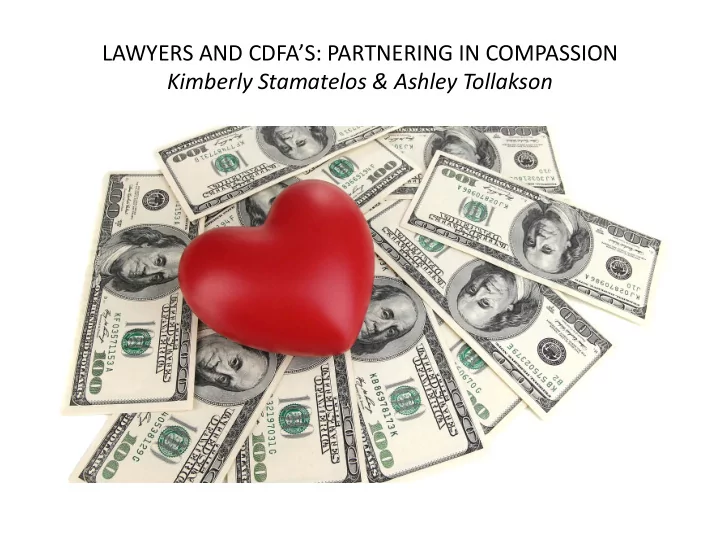

LAWYERS AND CDFA’S: PARTNERING IN COMPASSION Kimberly Stamatelos & Ashley Tollakson
CHECKING IN WITH YOURSELF
BREATH (Greek = pnevma) • Most important life sustaining process. • Breathing deeply: – Improves quality of health and emotions. – Improves ability to be more fully present and centered. – Helps us show up more fully open and available for both the beauty and challenges of life.
JOURNAL YOUR INTENTION
YOUR ROLE IN OUR WORKSHOP • Being fully present without technology distractions. • Taking notes on things that resonate. • Recognizing the power and gift of our breath. • Being continuously awake and aware of your intention (purpose) for this time together .
OUR INTENTION FOR THIS WORKSHOP • To introduce you to the idea of using compassion in your work so you can be a more effective problem solver and help clients act in their enlightened self interest.
BEFORE WE BEGIN: A QUESTION • Can you explore the topic of compassion without fear, judgment or resistance? • If the answer is no, what is getting in the way?
WHAT IS COMPASSION? Deep awareness of the suffering of another accompanied by a strong desire to alleviate the suffering.
WHAT COMPASSION IS NOT • Just being nice • Being a doormat • Letting go of healthy boundaries • Allowing others to walk all over you • Staying quiet instead of speaking your truth
• A Story of Roger • Sharing Your Stories • Debrief
EMOITIONAL CONTAIGON • 2002 Yale Study confirms it exists. • Actor made eye contact, enthusiastic smiled often • Registered higher in cooperation, fairness, collaboration and overall group performance.
WHAT EMOTIONS COME UP AROUND MONEY? • How can you use emotional contagion? • Do we see better results when its used?
COLLABORATIVE LAW INTENTION Over-arching theme of compassion and positive emotion .
WHAT ABOUT SELF-COMPASSION? “Instead of mercilessly judging and criticizing yourself for various inadequacies or shortcomings, self-compassion means you are kind and understanding when confronted with personal failings – after all, who said you were supposed to be perfect?” – Kristin Neff
SELF-COMPASSION IS NOT • Self esteem ( positive self worth; I’m a good person.) • Self pity • A sign of weakness • Selfish • An excuse to stay stuck or complacent
Self compassion research shows 1. Valuable Source of Resiliency and Coping 1. Being Good to Yourself Helps You be Good to Others
HOW TO PRACTICE SELF COMPASSION 1. Acknowledge you’re suffering and worthy of compassion. The Inner Critic • 2. Recognize Suffering is the universal condition. (undramatic quiet failure is the norm) Pause and Make a Choice • 3. Switch to self compassion mode. The Inner Mentor •
4. Use soothing touch.
BIGGEST SABOTEURS • All or none thinking • Feeling self-indulgent • Triggers (hunger, tired, overworked) • Perfectionism • Putting everyone else’s needs first
Exercising Self-Care 2012 Olympic Trials Marathon – Houston, Texas
Minimizing Triggers 1. Sleep –getting enough sleep is vital to our physical and spiritual well-being. The way you feel when you’re awake depends in part on what happens while you’re sleeping. Sleep plays a role in all of the following: • Healthy Brain Function and Emotional Well-Being • Physical Health • Daytime Performance and Safety
How much sleep is enough? Age Recommended Amount of Sleep Newborns 16–18 hours a day Preschool-aged children 11–12 hours a day School-aged children At least 10 hours a day Teens 9–10 hours a day Adults (including the elderly) 7–8 hours a day • If you routinely lose sleep or choose to sleep less than needed, the sleep loss adds up. The total sleep lost is called your sleep debt . For example, if you lose 2 hours of sleep each night, you’ll have a sleep debt of 14 hours after a week.
EXERCISE / PHYSICAL ACTIVITY • Benefits of Regular Physical Activity 1. Exercise controls weight 2. Exercise combats health conditions and diseases 3. Exercise improves mood 4. Exercise boosts energy 5. Exercise improves brain function 6. Exercise improves sleep
Food / Nutrition Tips to develop a healthy • eating plan: 1. Pay attention to portion control. 2. Always drink plenty of water. 3. Vary your food choices to make sure you get a wide variety of vitamins. and other nutrients to avoid boredom. 4. Know the recommended daily calorie intake for your age, weight, height, activity level and gender. 5. Don’t deprive yourself of foods you love; just enjoy them in moderation.
• WHAT DO YOU DO NOW FOR SELF- COMPASSION AND SELF-CARE? • WHAT CAN YOU DO DIFFERENTLY GOING FORWARD?
A Self Compassion Meditation • “This is really painful, but I realize that I am not alone in my suffering. May I be loving towards myself and accept myself just the way I am.”
Recommend
More recommend